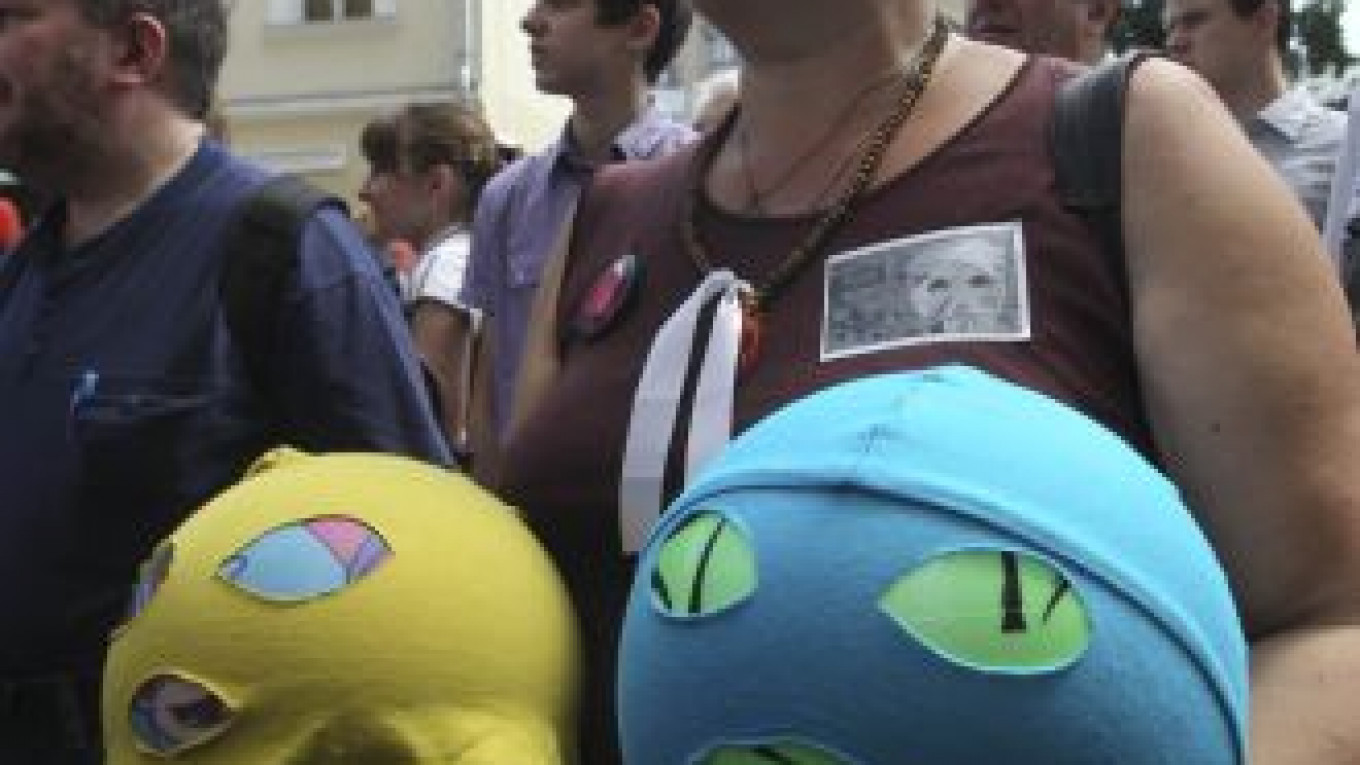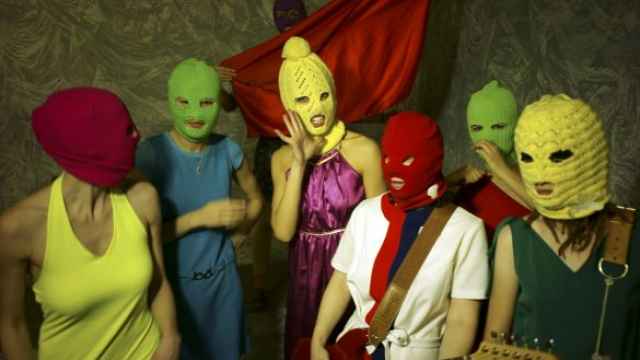A court on Wednesday rejected a plea by Pussy Riot for extra time to read the charges against them even as investigators added 100 pages to the case — an escalation in tensions that seemed to reveal itself in the courtroom when the young punk rockers fell ill and required medical assistance.
The trial of the three defendants, who face up to seven years in prison for performing an anti-Putin song in Moscow’s Christ the Savior Cathedral in February, is moving along rapidly after opening Monday, and the verdict could be handed down within days, defense lawyer Nikolai Polozov said.
“Judging by the speed with which the case is being heard, the verdict can be read as soon as next week,” he reporters late Wednesday.
The defendants — Nadezhda Tolokonnikova, 22; Maria Alyokhina, 24; and Yekaterina Samutsevich, 29 — have been in jail since early March, and prosecutors’ insistence on filing the felony charge of “hooliganism motivated by religious hatred” rather than a lighter misdemeanor charge of mere hooliganism has raised a red flag both in Russia and abroad that the case is politically tinged.
Joining calls for a fair trial, U.S. State Department spokesman Patrick Ventrell Tuesday that the United States was concerned over the "politically motivated prosecution of the Russian opposition and pressure on those who express dissenting views.” The comments referred to both Pussy Riot and opposition leader Alexei Navalny, who was charged with theft earlier in the day.
Former British foreign ministers Malcolm Rifkind and David Miliband called on President Vladimir Putin to immediately free all political prisoners, including Pussy Riot, in an open letter in The Times of London on Wednesday.
Meanwhile, Pussy Riot lawyers discovered late Tuesday that another 100 pages had been added to the criminal case against their clients, Novaya Gazeta .
But any hopes that they might have had to read them carefully together with the other 2,800 pages of the case were dashed Wednesday when the Moscow City Court ruled that the deadline to examine the documents had expired July 9. The ruling an earlier decision by the Tagansky District Court. Defense lawyers had asked for an extra month.
Polozov, the defense lawyer, called into question the validity of witness testimony detailed in the criminal case, saying investigators had attributed identical testimony to multiple witnesses.
“Whole paragraphs repeat one another word for word, up to spelling mistakes,” he said, according to Rapsi, a judicial news agency.
Another defense lawyer, Violetta Volkova, said the identical testimony could be reason to prosecute some witnesses for “lying,” the report said.
In the Khamovnichesky District Court, where the trial is unfolding, doctors rushed in after the defendants fell ill. Polozov said that lack of food and sleep and a grueling routine were to blame for their weak condition.
"Unfortunately, such an outcome was expected,” he told Interfax. “For the third day in a row they [prison guards] have woken the girls up at 5 a.m. and kept them in a 1-meter-by-1-meter room for several hours without air circulation before taking them to court.
"They don't feed them, and the court hearings last for 12 hours," he said, adding that the hot summer weather had also contributed to the strain on the women.
On Wednesday, court officials made an aborted effort to ban journalists from quoting witness testimony from the trial.
Court spokeswoman Darya Lyakh explained that the ban was aimed at preventing those who have not yet testified from being influenced by what has been said in court, Interfax reported.
She told news site Lenta.ru that journalists who broke the ban would be barred from attending further hearings and that written warnings would be sent to their editors.
But after an uproar broke out about the ban, Lyakh backtracked, saying reporters had misunderstood her and that she had only asked them to consider not quoting witnesses.
A Message from The Moscow Times:
Dear readers,
We are facing unprecedented challenges. Russia's Prosecutor General's Office has designated The Moscow Times as an "undesirable" organization, criminalizing our work and putting our staff at risk of prosecution. This follows our earlier unjust labeling as a "foreign agent."
These actions are direct attempts to silence independent journalism in Russia. The authorities claim our work "discredits the decisions of the Russian leadership." We see things differently: we strive to provide accurate, unbiased reporting on Russia.
We, the journalists of The Moscow Times, refuse to be silenced. But to continue our work, we need your help.
Your support, no matter how small, makes a world of difference. If you can, please support us monthly starting from just $2. It's quick to set up, and every contribution makes a significant impact.
By supporting The Moscow Times, you're defending open, independent journalism in the face of repression. Thank you for standing with us.
Remind me later.






